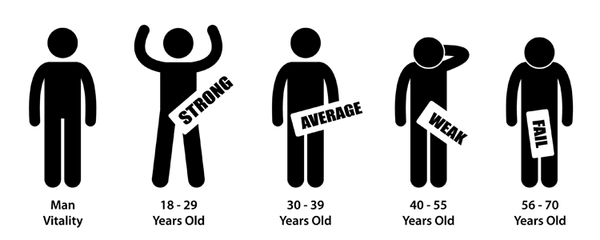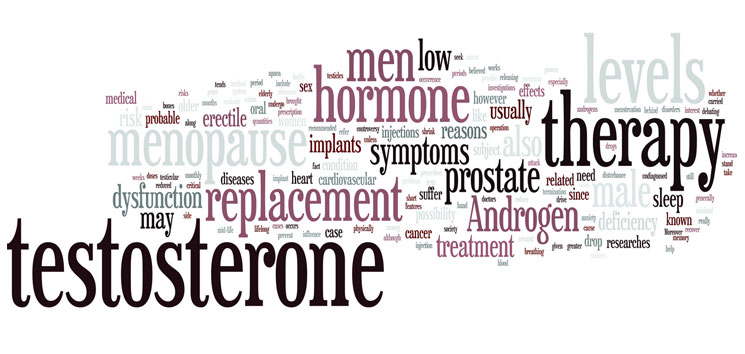Testosterone is a vitally important hormone in the male body. Responsible for a wide range of characteristics such as muscle mass, endurance, strength and immune system function, testosterone production levels are intrinsically linked to overall male health and vitality.
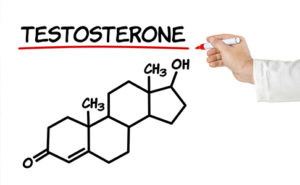 Low testosterone can lead to an equally broad range of health disorders and chronic diseases, as well as weight gain, depression and anxiety. It is an incredibly common condition that affects up to one in four men. There are many causes that contribute to low testosterone production, but the most common is a natural reduction in the testosterone synthesis of the body.
Low testosterone can lead to an equally broad range of health disorders and chronic diseases, as well as weight gain, depression and anxiety. It is an incredibly common condition that affects up to one in four men. There are many causes that contribute to low testosterone production, but the most common is a natural reduction in the testosterone synthesis of the body.
Known as andropause, this phenomenon begins around the age of 22 and continues until the age of 65, with testosterone levels dropping by 2% to 4% every year. By the time a man reaches the age of 40, testosterone levels have dropped to the point where they can cause serious health issues.
Another common factor that reduces testosterone levels is hormonal imbalance caused by xenoestrogens and hormone-destabilizing chemicals. Many of the foods that are commonplace throughout the kitchens and the restaurants of the modern world contain ingredients and additives that function as estrogen when they are ingested, lowering testosterone levels.
Synthetic chemicals such as sodium lauryl sulfate and other powerful cleaners have also been demonstrated to destabilize the hormonal system.
Several clinical studies have shown that in countries where the contraceptive pill is commonly used even the municipal drinking water contains high levels of phytoestrogens, minimizing the testosterone levels of men through the very water they drink on a daily basis.
Given the broad spectrum of disruptive foreign influences on the hormonal chemistry of the male body, it’s easy to understand that testosterone imbalance is becoming more and more widespread.
Synthetic Testosterone Replacement Therapy Dangers
One solution many men turn to in order to combat the symptoms of andropause is testosterone replacement therapy, or TRT.
Commonly available to men who either suffer from unnaturally low blood testosterone levels or older men that suffer from the health consequences of advanced andropause, TRT involves either the injection or transdermal application of synthetic testosterone to return hormone levels to normal. This procedure, while effective, is not without significant drawbacks.
Firstly, many doctors will provide TRT treatment to individuals that have not had a conclusive testosterone blood test, meaning prescriptions for this powerful treatment are often given out without sufficient prior assessment.
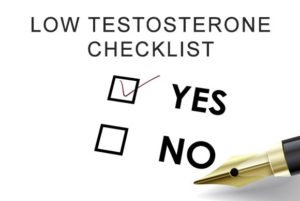 Undergoing TRT while the body is still producing a normal amount of testosterone can have serious consequences on the hormonal balance of the body. The most concerning effect of TRT on the male body is a little-know one.
Undergoing TRT while the body is still producing a normal amount of testosterone can have serious consequences on the hormonal balance of the body. The most concerning effect of TRT on the male body is a little-know one.
The body seeks to maintain a state of homeostasis, or least-energy balance, which is why it’s hard to maintain muscle mass when not working out- the body doesn’t like to expend energy it doesn’t need to.
This same effect extends to the production of testosterone in the body- if you’re supplying the body with testosterone through TRT, the testosterone-producing cells of the body shut down and cease to generate testosterone by themselves.
The side effects caused by this phenomena are concerning. If a man undergoing TRT stops therapy, the sudden and complete drop in testosterone levels will cause the gonads to shrink, induce acute fatigue, dramatically lower libido and cause depression.
In order to reboot the testosterone production system, TRT users must take even more synthetic chemicals that interfere with the hormonal system.
Testosterone Replacement Therapy Alternatives
There is a little-known pharmaceutical solution that offers men suffering from low testosterone an effective way to increase testosterone levels without complete replacement.
A naturally-occurring chemical compound called clomiphene citrate has been demonstrated in multiple clinical trials to dramatically increase testosterone levels not by completely replacing hormones, but promoting their synthesis within the body.
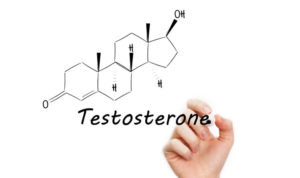 Clomiphene citrate is a commonly available generic medication that has been approved for use in the United States since 1967. Clomiphene citrate brands include Clomid, Serophene and Clomiphene, with the wholesale cost of a treatment less than $5 USD.
Clomiphene citrate is a commonly available generic medication that has been approved for use in the United States since 1967. Clomiphene citrate brands include Clomid, Serophene and Clomiphene, with the wholesale cost of a treatment less than $5 USD.
This unique chemical compound is a selective estrogen receptor modulator, and has traditionally been used to treat female infertility. The applications of clomiphene citrate as a testosterone boosters, however, are promising.
A 2012 clinical trial published by the Memorial Sloan-Kettering Cancer Center that assessed 86 men with low testosterone levels found that clomiphene citrate was able to significantly increase testosterone levels, concluding that it is a safe and effective alternative to TRT.
Another 2012 study concluded that a 25 mg dose of clomiphene citrate is able to stimulate the secretion of testosterone in the body by up to 90%.
Clomiphene has even been demonstrated to increase the testosterone levels of obese individuals without the need for any exercise or physical activity.
The main advantage of clomiphene citrate over TRT is that, instead of replacing the ability of the body to generate testosterone, it works in harmony with the hormonal system and causes an increase in testosterone production.
The primary reason clomiphene citrate isn’t used to treat low testosterone in America is that it has not as yet been approved by the FDA as a treatment for this specific condition.
While clomiphene citrate isn’t available over-the-counter in the United States, it can, however, be purchased from a number of online pharmacies with no prescription.
Natural Ways To Increase Testosterone
If you believe you suffer from low testosterone and don’t want to take synthetic chemical pharmaceuticals, or have a baseline testosterone level that doesn’t necessitate TRT but would like to increase testosterone production regardless, there are a number of lifestyle changes you can make to boost testosterone naturally.
The first step in determining whether you have healthy testosterone levels is to consult with a medical professional and have a blood test done. A doctor will be able to inform you of your blood testosterone levels and whether there is any cause for concern.
As a general rule, however, more naturally- produced testosterone is always a good thing. Increasing testosterone production through lifestyle changes and dietary habits is a great way to not only increase test levels but also promote overall vitality and health.
Here are a few quick tips on boosting your natural testosterone production:
- Exercise regularly. Studies show that regular physical exercise, especially strength training, significantly increases testosterone production.
- Lose body fat. It has been conclusively proven that adipose fat deposits and a high BMI cause a significant drop in testosterone levels.
- Follow a low-carb diet. Not only will minimizing carbohydrates help you lose weight, but cutting carbs from your diet has been demonstrated in multiple clinical trials to increase the rate at which the body is able to synthesize testosterone.
- A regular, healthy sleeping pattern has been shown to increase testosterone production. Make sure you’re getting at least 8 hours of restful sleep every night.
- Avoid foods that are high in xenoestrogens and estrogens. These foods include soy, soy milk, factory farm chicken breast, milk, dried fruits, beans and tempeh.
- Avoid BPA plastic. BPA plastics, such as those commonly used in food packaging and water bottles, have been conclusively demonstrated to function as xenoestrogens that minimize testosterone production.
- Consider supplementing your diet with herbal testosterone boosters. Botanical extracts such as tribulus terrestris have been shown to boost testosterone, as have both essential amino acids and branched chain amino acids. Creatine, a sports supplement made as a by-product from meat, has been shown to increase testosterone production by up to 44%.
Overall, low testosterone is typically a symptom of a sedentary lifestyle and poor eating habits. By introducing a regular strength training routine into your lifestyle and eating a healthy diet, you’ll simultaneously increase your testosterone levels as well as built a healthier, stronger body.
Always assess your dietary intake for potential xenoestrogens, and try to keep your lifestyle BPA-plastic and chemical free, and you’ll notice a gradual increase in strength, muscle mass, libido and endurance.







